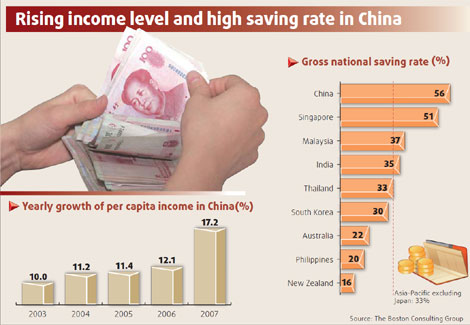While the full impact of the global financial crisis on the growth rates of Chinese wealth in 2008 has yet to be seen, China is clearly the most important opportunity for wealth managers in Asia excluding Japan.
 |
| Foreign banks eye nation's growing wealth |
According to a report from global management consulting firm and business strategy advisor Boston Consulting Group (BCG), China continued to have the highest percentage increase in assets under management (AuM), at 27.8 percent when measured in local currency terms and 36.8 percent in US dollar terms, boosted by very strong economic growth, and the appreciation of renminbi last year.
With Chinese households owning about US$3.2 trillion in financial wealth, the nation is now home to approximately 44 percent of the wealth in the Asia-Pacific excluding Japan, said the report, "Wealth Markets in China: The Beginning of the Race for China's Rich".
"Three aspects make China's wealth market stand out. It's a large yet very fast-growing market, it has a very high savings rate of 56 percent and it also boasts exceptionally high cash holdings of 63 percent in terms of AuM," said Tjun Tang, coauthor of the report and a Boston Consulting Group Greater China partner.
Continued growth in the Chinese market is expected to be supported by strong ongoing growth in the Chinese economy and liberalizing market conditions.
BCG projected annual growth of household financial assets in China of approximately 20.5 percent over the next few years, resulting in AuM reaching an estimated $8.1 trillion by 2012.
The consulting firm also estimated that the number of financial asset millionaire households in China grew to approximately 391,000 last year, recording growth rates of 19 percent year-on-year from 2002 to 2006 and an astounding growth rate of 34 percent from 2006 to 2007.
In comparison, the number of millionaire households in the Asia-Pacific excluding Japan grew to around 1.3 million in 2007.
China has been placed as fifth in the world in terms of millionaires, ahead of many of the world's developed countries and only behind the United States, Japan, the United Kingdom and Germany.
Over the next five years, propelled by the continued rapid expansion of the Chinese economy, BCG forecasted that the number of Chinese millionaires could reach 858,000 by 2012.
Last year saw major changes in private banking in China, with the government allowing foreign lenders to be locally incorporated and to provide local currency retail business and wealth management services to local individuals.
Many foreign banks have entered the private banking businesses in China, establishing serious competition to Chinese incumbents for this highly profitable customer segment. As a consequence, many Chinese banks accelerated their plans to build private banking offerings of their own.
Although advantages still exist for local banks, locally incorporated foreign lenders also offer their own strengths in wealth management, given their prior experience, institutional knowledge, breadth of products, complementary offshore and onshore offering, brand and prestige.
And they are expected to pursue the private banking business as this is more accessible to them considering their limited retail branch network.
Commercial banks that have built businesses in the wealth management area have benefited from the growth of the wealth market. In 2007, net fee income as a percentage of banking services of major commercial banks reported a healthy growth of 50 percent to 100 percent. However, the current level of net fee income by local banking players still significantly lags behind major banks in developed markets.
"Last year was a milestone year for the start of private banking in China. Going forward, we observe major difficulties that foreign and Chinese banks face in order to win in this segment," said Frankie Leung, another coauthor of the report and a partner of BCG Hong Kong.
He noted that migrating away from a product-driven servicing model toward the role of a trusted financial advisor, expanding product offerings, and tackling organization and human resource issues are the three most challenging tasks for Chinese wealth managers in the near future.
The report also details seven key building blocks that are critical to successfully differentiate against competitors, and to win and better service clients in the Chinese market.
These are designing a value creating operating model and wealth advisory process, setting up well-structured customer prospecting and acquisition, providing a compelling product offering, creating programs to recruit and develop talented relationship managers, establishing a clear brand promise for private banking operations, building the necessary IT platform, as well as ensuring active management of the business-model economies.
Rising wealth in China is creating many opportunities for Chinese and international banks to prosper in serving high net-worth clients.
"It is possible to make money with different business models, value propositions, and targeted customer segments. The key is to ensure that one is clear about which segments to pursue, what the unique competitive advantages might be, and how to align all aspects of the business with the bank's strategic goals," said Holger Michaelis, coauthor of the report and a partner of BCG Beijing.
(China Daily November 14, 2008)